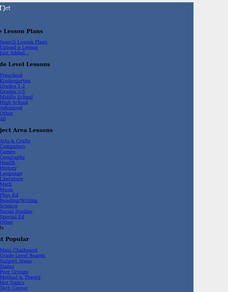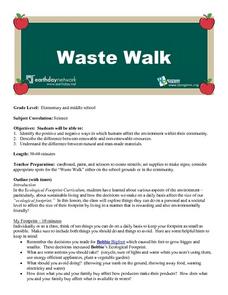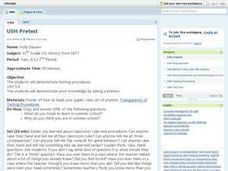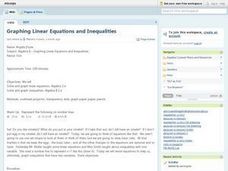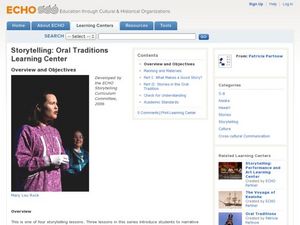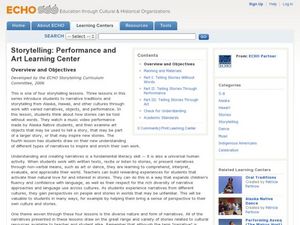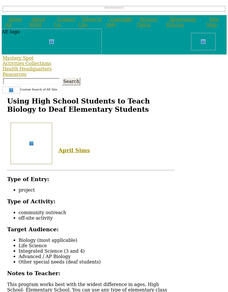Curated OER
Are School Trips Too Risky?
Students analyze and chart what risks are involved on school field trips. Students devise a study trip to take and dissect at the end of their findings. Students scale the conditions of what a risk is and we can manage them in the future.
Curated OER
Oscar Grammar
Students practice listening, grammar skills and reading comprehension as they complete an "Oscar (the dog) Grammar" worksheet.
Curated OER
Fast Forward
Pupils view a television program exploring social and economic changes at the close of the twentieth century. They discuss changes from differing perspectives including poor and rich citizens from various countries. Students write an...
Curated OER
Basketball Relays
Students have basketball relays with the basketball and examine how to dribble the basketball and control the basketball without letting it get away. After much practice, they examine how to move quickly with the basketball.
Curated OER
Environment: Waste Walk
Young scholars assess the positive and negative affects of humans on the environment. The lesson explores ways in which individuals and societies can reduce the negative impact on the environment. By taking a "waste walk" around their...
Curated OER
Is Capitalism Good for the Poor? | How Incentives Affect Innovation
Students focus on the role played by a nation's institutions in generating creativity, invention and innovation, and analyzes how innovation promotes the economic growth that raises standards of living and alleviates poverty.
Curated OER
Chart Challenge: Behavior Management
Learners develop a behavior management plan using Excel. They use the computer to develop a behavior chart. Students record their behavior on a daily basis using the chart they developed using Excel.
Curated OER
Penguin Writing
After discussing the main events in Mr. Popper’s Penguins, young writers describe in sequence what they would do if they had 12 penguins living in their house. The narratives are then glued onto a penguin cut-out, mounted on construction...
Curated OER
United States History Pretest
Have your U.S. history class engage in pre-assessment activities at the beginning of the school year. They activate prior knowledge to answer questions. They also use information about particular topics to fill in a graphic organizer....
Curated OER
Hatching Chickens
Students observe chickens hatching in a classroom incubation environment In this egg-hatching lesson plan, students make observations of the hatching process and later care for the hatched chickens.
Curated OER
Graphing Linear Equations and Inequalities
Students discuss methods to solve equations and inequalities with one variable. As a review, they write Addition and Subtraction properties of equality and Multiplication and Division properties of equality. Students graph points, write...
Curated OER
Targeting Young Speeders
Students research the police ticketing of teens in their city or county. They determine if the police are targeting teens and why. Students explore other ways the community tries to ensure safer teen drivers. They survey teens in school....
Curated OER
Storytelling: Oral Traditions Learning Center
Students explore the oral traditions. In this storytelling lesson, students compare and contrast stories from the cultural traditions of Alaska and Hawaii.
Curated OER
Weather Lesson
Students discuss the weather conditions. They read thermometer, rain gauge, barometer, and wind direction and speed. They record observations of weather conditions and enter information into data base on the computer.
Curated OER
Mars Fraction Hunt
Students use fractions and words to find a coded message and the first student to solve the message wins a candy bar.
Curated OER
Studying Florida's Constitution: State's Rights
Learners examine the basic rights in their state's constitution. They vote on a class issue, analyze how an amendment is passed, develop a flow chart to demonstrate the steps, and write and illustrate a booklet about their basic rights.
Curated OER
Step Into the Past: Change and Growth in Arkansas
The concept of change over time is presented in this history lesson. In it, learners discuss how some things stay the same over time, while other things change. Teams of students research and create a timeline of important events that...
Curated OER
Mountain Biking - Riding Uphill
Mountain biking sounds like a lot of fun, but it also sounds like a lot of hard work! You have to get uphill to enjoy the ride downhill. Learn about shifting gears to go uphill and to keep your weight balanced properly. This is one...
Curated OER
Storytelling: Writers' Workshop Learning Center
Evaluating a variety of narrative texts can help build strong writers. Pupils identify plot elements and their relation to personal experience, then apply what they gleaned from the class discussion to create their own narratives.
Curated OER
Storytelling: Performance and Art Learning Center
Tenth graders explore the process of telling stories without words. In this literature lesson, 10th graders watch a music video performance made by Alaska Native students, and then examine art objects that may be used to tell a...
Curated OER
Plants 'n' Bugs
Second graders experiment to find if pollinators have color preferences. In this plant and bug lesson, 2nd graders gather information about how flowers pollinate. Students participate in a pollination experiment using the...
Curated OER
Earth Day - Hooray
Students listen to the story, Earth Day - Hooray!, and discuss the story as it is being read. In this Earth Day lesson, students discuss incentives and penalties in regards to taking care of the Earth. This lesson plan also...
Curated OER
Order of Operations
Students analyze the Order of Operations. They play a game to explore Order of Operations and observe a PowerPoint presentation slide sow. They generate patterns and functions to represent and solve problems. Students model and solve...
Curated OER
Using High School Students to Teach Biology to Deaf Elementary Students
Students teach Biology concepts to elementary students, in particular deaf students, by traveling once a month to the elementary classroom with activities / lessons that have been selected and prepared by the older students.

